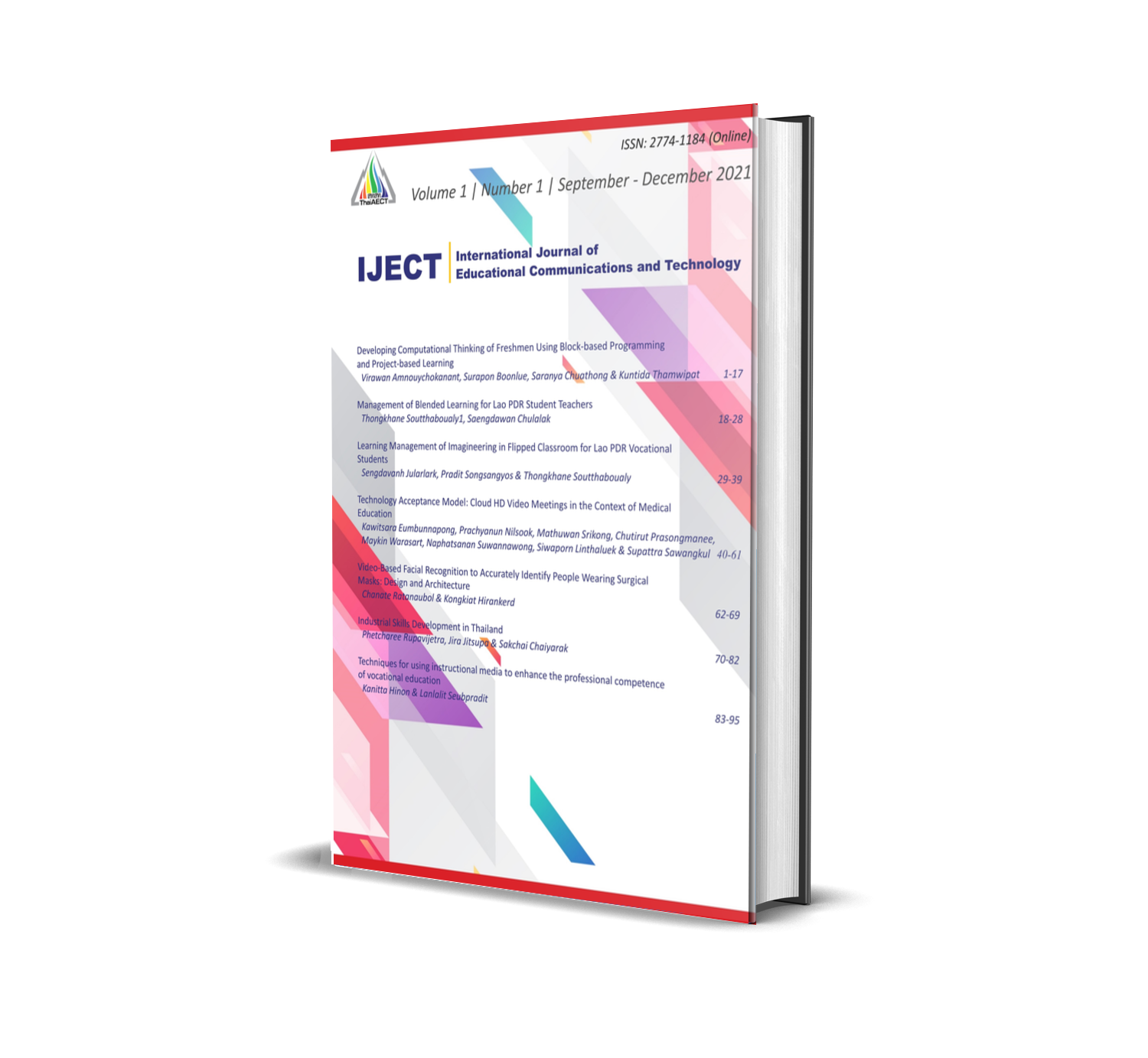Smart Campus Vocational College with Digital Twin for Sustainable Comfort Monitoring
Keywords:
Digital twin, IOT, Environmental monitoring, Smart campusAbstract
Vocational colleges present obstacles to the development of organizations and knowledge that can meet the needs of smart campuses. At the same time, smart campuses promote environmental sustainability and stimulate the widespread use of new information and communication technologies. That is why the smart campus of the College of Vocational Education has been developed. This is a college where technology, equipment and applications create new experiences or services and facilitate them. The Vocational College’s Smart Campus is conceptualized as a testing base for other smart campuses, and has been driven by the need to research smart and sustainable approaches to life, colleges, vocational education, higher education and other activities that have never been thoroughly addressed. This research proposes the Vocational College's Smart Campus concept to simulate data generation with an IOT-based network of wireless sensors in the field of environmental monitoring and mood detection to provide insight into comfort levels, in addition to exploring the university's ability to participate in sustainability projects. Preliminary results highlight the importance of workspace monitoring, as performance has been proven to be directly influenced by the environment in vocational colleges to increase energy efficiency.
References
Alvarez-Campana, M., López, G., Vázquez, E., Villagrá, V. A., & Berrocal, J. (2017). Smart CEI moncloa: An iot-based platform for people flow and environmental monitoring on a Smart University Campus. Sensors (Switzerland), 17(12). https://doi.org/10.3390/s17122856
Bracco, S., Brignone, M., Delfino, F., Laiolo, P., & Procopio, R. (2018). The University of Genoa Smart City Demo Site; The University of Genoa Smart City Demo Site. In 2018 AEIT International Annual Conference.
Chiandone, M., Feste, M. D., Bosich, D., & Sulligoi, G. (2019). Real-time monitoring and control system for Trieste University Campus electrical distribution grid; Real-time monitoring and control system for Trieste University Campus electrical distribution grid. In 2019 IEEE Milan PowerTech.
Dan Moiş, G., Sanislav, T., Folea, S. C., & Zeadally, S. (2018). Performance evaluation of energy-autonomous sensors using power-harvesting beacons for environmental monitoring in internet of things (IoT). Sensors (Switzerland), 18(6). https://doi.org/10.3390/s18061709
Du, S., Meng, F., & Gao, B. (2016). Research on the Application System of Smart Campus in the Context of Smart City; Research on the Application System of Smart Campus in the Context of Smart City. 2016 8th International Conference on Information Technology in Medicine and Education (ITME). https://doi.org/10.1109/ITME.2016.25
Elayan, H., Aloqaily, M., & Guizani, M. (2021). Digital Twin for Intelligent Context-Aware IoT Healthcare Systems. IEEE Internet of Things Journal, 8(23), 16749–16757. https://doi.org/10.1109/JIOT.2021.3051158
Fantozzi, F., Hamdi, H., Rocca, M., & Vegnuti, S. (2019). Use of automated control systems and advanced energy simulations in the design of climate responsive educational building for mediterranean area. Sustainability (Switzerland), 11(6). https://doi.org/10.3390/su11061660
Fernández-Macías, E. 1976-, Hurley, J., Peruffo, E., Storrie, D. W. 1953-, Poel, M., Packalén, E., & European Foundation for the Improvement of Living and Working Conditions. (n.d.). Game changing technologies exploring the impact on production processes and work.
Fialho, B. C., Codinhoto, R., Fabricio, M. M., Estrella, J. C., Neves Ribeiro, C. M., dos Santos Bueno, J. M., & Doimo Torrezan, J. P. (2022). Development of a BIM and IoT-Based Smart Lighting Maintenance System Prototype for Universities’ FM Sector. Buildings, 12(2). https://doi.org/10.3390/buildings12020099
Filho, T., Fernando, L., Rabelo, M., Silva, S., Santos, C., Ribeiro, M., Grout, I. A., Moreira, W., & Oliveirajr., A. (2021). A standard-based internet of things platform and data flow modeling for smart environmental monitoring. Sensors, 21(12). https://doi.org/10.3390/s21124228
Fortes, S., Hidalgo-Triana, N., Sánchez-La-chica, J. M., García-Ceballos, M. L., Cantizani-Estepa, J., Pérez-Latorre, A. V., Baena, E., Pineda, A., Barrios-Corpa, J., & García-Marín, A. (2021). Smart tree: An architectural, greening and ict multidisciplinary approach to smart campus environments. Sensors, 21(21). https://doi.org/10.3390/s21217202
Fortes, S., Santoyo-Ramón, J. A., Palacios, D., Baena, E., Mora-García, R., Medina, M., Mora, P., & Barco, R. (2019). The campus as a smart city: University of málaga environmental, learning, and research approaches. Sensors (Switzerland), 19(6). https://doi.org/10.3390/s19061349
Gallastegui, L. M. G., & Forradellas, R. F. R. (2021). Business methodology for the application in university environments of predictive machine learning models based on an ethical taxonomy of the student’s digital twin. Administrative Sciences, 11(4). https://doi.org/10.3390/admsci11040118
Hannan, M. A., Faisal, M., Ker, P. J., Mun, L. H., Parvin, K., Mahlia, T. M. I., & Blaabjerg, F. (2018). A review of internet of energy based building energy management systems: Issues and recommendations. IEEE Access, 6, 38997–39014. https://doi.org/10.1109/ACCESS.2018.2852811
John, T. M., Ucheaga, E. G., Badejo, J. A., & Atayero, A. A. (2018). A Framework for a Smart Campus: A Case of Covenant University. Proceedings - 2017 International Conference on Computational Science and Computational Intelligence, CSCI 2017, 1371–1376. https://doi.org/10.1109/CSCI.2017.239
Kuandee, W., Nilsook, P., & Wannapiroon, P. (2019). Asset supply chain management system-based IoT technology for higher education institutions. International Journal of Online and Biomedical Engineering, 15(3), 4–20. https://doi.org/10.3991/ijoe.v15i03.8533
Leal Filho, W., Raath, S., Lazzarini, B., Vargas, V. R., de Souza, L., Anholon, R., Quelhas, O. L. G., Haddad, R., Klavins, M., & Orlovic, V. L. (2018). The role of transformation in learning and education for sustainability. Journal of Cleaner Production, 199, 286–295. https://doi.org/10.1016/j.jclepro.2018.07.017
Liu, J., Wang, C., & Xiao, X. (2021a). Internet of Things (IoT) Technology for the Development of Intelligent Decision Support Education Platform. Scientific Programming, 2021. https://doi.org/10.1155/2021/6482088
Liu, J., Wang, C., & Xiao, X. (2021b). Internet of Things (IoT) Technology for the Development of Intelligent Decision Support Education Platform. Scientific Programming, 2021. https://doi.org/10.1155/2021/6482088
Majeed, S., Uzair, M., Qamar, U., & Farooq, A. (2020, November 5). Social Network Analysis Visualization Tools: A Comparative Review. Proceedings - 2020 23rd IEEE International Multi-Topic Conference, INMIC 2020. https://doi.org/10.1109/INMIC50486.2020.9318162
Malche, T., Maheshwary, P., & Kumar, R. (2019). Environmental Monitoring System for Smart City Based on Secure Internet of Things (IoT) Architecture. Wireless Personal Communications, 107(4), 2143–2172. https://doi.org/10.1007/s11277-019-06376-0
Moura, P., Moreno, J. I., López, G. L., & Alvarez-Campana, M. (2021). IoT platform for energy sustainability in university campuses. Sensors (Switzerland), 21(2), 1–22. https://doi.org/10.3390/s21020357
Omotayo, T., Moghayedi, A., Awuzie, B., & Ajayi, S. (2021). Infrastructure elements for smart campuses: A bibliometric analysis. In Sustainability (Switzerland) (Vol. 13, Issue 14). MDPI. https://doi.org/10.3390/su13147960
Picone, M., Mamei, M., & Zambonelli, F. (2021). WLDT: A general purpose library to build IoT digital twins. SoftwareX, 13. https://doi.org/10.1016/j.softx.2021.100661
Radanliev, P., de Roure, D., Nicolescu, R., Huth, M., & Santos, O. (2022). Digital twins: artificial intelligence and the IoT cyber-physical systems in Industry 4.0. International Journal of Intelligent Robotics and Applications, 6(1), 171–185. https://doi.org/10.1007/s41315-021-00180-5
Ricciardi, P., & Buratti, C. (2018). Environmental quality of university classrooms: Subjective and objective evaluation of the thermal, acoustic, and lighting comfort conditions. Building and Environment, 127, 23–36. https://doi.org/10.1016/j.buildenv.2017.10.030
Sanglub, A., Nilsook, P., & Wannapiroon, P. (2019). Imagineering on augmented reality and digital twin for digital competence. International Journal of Information and Education Technology, 9(3), 213–217. https://doi.org/10.18178/ijiet.2019.9.3.1201
Shea, R. P., Worsham, M. O., Chiasson, A. D., Kelly Kissock, J., & McCall, B. J. (2020). A lifecycle cost analysis of transitioning to a fully-electrified, renewably powered, and carbon-neutral campus at the University of Dayton. Sustainable Energy Technologies and Assessments, 37. https://doi.org/10.1016/j.seta.2019.100576
Uskov, V., Bakken, J., Howlett, R., & Jain, L. (2018). Smart Universities: Concepts, Systems, and Technologies. In Smart Innovation (Vol. 70). https://doi.org/10.1007/978-3-319-59454-5
Vasileva, R., Rodrigues, L., Hughes, N., Greenhalgh, C., Goulden, M., & Tennison, J. (2018). What smart campuses can teach us about smart cities: User experiences and open data. Information (Switzerland), 9(10). https://doi.org/10.3390/info9100251
Villegas-Ch, W., Palacios-Pacheco, X., & Luján-Mora, S. (2019). Application of a smart city model to a traditional university campus with a big data architecture: A sustainable smart campus. Sustainability (Switzerland), 11(10). https://doi.org/10.3390/su11102857
Villegas-Ch, W., Palacios-Pacheco, X., & Román-Cañizares, M. (2020). An internet of things model for improving process management on university campus. Future Internet, 12(10), 1–16. https://doi.org/10.3390/fi12100162
Wu, D., Zhang, X., & Ming, Y. (2020). IOT Technology-Based Construction and Management of College Sports Information Platform. ACM International Conference Proceeding Series, PartF168341, 223–226. https://doi.org/10.1145/3446999.3447636
Yang, A. M., Li, S. S., Ren, C. H., Liu, H. X., Han, Y., & Liu, L. (2018). Situational Awareness System in the Smart Campus. IEEE Access, 6, 63976–63986. https://doi.org/10.1109/ACCESS.2018.2877428
Zaballos, A., Briones, A., Massa, A., Centelles, P., & Caballero, V. (2020). A smart campus’ digital twin for sustainable comfort monitoring. Sustainability (Switzerland), 12(21), 1–33. https://doi.org/10.3390/su12219196
Downloads
Published
How to Cite
Issue
Section
License
Copyright (c) 2022 International Journal of Educational Communications and Technology

This work is licensed under a Creative Commons Attribution-NonCommercial-NoDerivatives 4.0 International License.







